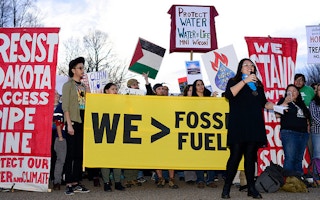Cities must step in to fight climate change if national governments like the United States under President Trump back off commitments to slow global warming, a top New York City official said on Wednesday.
Policies under Donald Trump, who has dismissed man-made climate change as a hoax, put the onus on cities to live up to the 2015 Paris agreement to reduce greenhouse gas emissions from fossil fuel, said Jainey Bavishi, director of the city’s Office of Recovery and Resiliency, at a Women4Climate conference.
The Trump administration is preparing to release a wide-ranging executive order to reduce the role that climate change plays in policy decisions.
The order, expected as soon as this week, will instruct the Environmental Protection Agency (EPA) and other agencies to overhaul use of the “social cost of carbon,” a policy from the previous Obama administration aimed at quantifying potential economic damage from climate change in regulations.
“It is irresponsible of the federal government to not play the role that it needs to play and instead to undermine the global progress that we’ve made on these important issues,” Bavishi told the conference that brought together mayors and representatives from cities including Paris, Mexico City, Caracas, Cape Town and Durban, South Africa.
“
We are entering a new era, and I think what this time has taught us is that nothing is a given.
Alexandra Palt, chief sustainability officer, L’Oreal
“Cities have an incredibly important role to play, not only in the United States but around the world,” she said.
Calling the changes likely under the Trump administration “the elephant in the room,” Bavishi said she worked on climate resilience under the administration of former President Barack Obama.
“We had the privilege, not only New York City but cities across the United States, of having a close partnership with Washington, D.C. over the last eight years, and clearly things are changing,” she said.
“New era”
Trump is widely expected to target Obama-era green regulations, including a federal coal mining ban and an initiative forcing states to cut carbon emissions.
The new EPA head said last week he is not convinced that carbon dioxide from human activity is the main driver of climate change. Carbon dioxide is widely accepted among scientists, energy experts and environmental advocates to be the primary greenhouse gas contributing to global warming and climate change.
“We are entering a new era, and I think what this time has taught us is that nothing is a given,” said Alexandra Palt, chief sustainability officer at the cosmetics giant L’Oreal , who called for companies and cities collaborate to fight climate change.
“In the last 15 to 20 years, we might have thought that fighting for women’s rights is a given and that acknowledging climate change is a given,” she said.
“But we have learned that we have to be alert.”
During his campaign, Trump said he would pull the United States out of the Paris agreement but since said he has an “open mind” about the 200-nation accord.
“We are all hoping, of course, that America will live up to its commitment to the Paris agreement, with the leadership of mayors and governors and businesses and citizens,” said Mark Watts, executive director of C40, a network of cities aimed at addressing climate change and organiser of the conference.
In New York City, Bavishi oversees a $20 billion program to strengthen coastal defenses, upgrade buildings, protect infrastructure and services and make neighborhoods resilient.
Much of the plan has been designed since 2012 when Hurricane Sandy devastated the city causing $19 billion in damages, she said. The storm’s severity is largely blamed on the effects of climate change.
“New York City is not going to wait for a global accord or Washington, D.C. to take action on the threats that climate change presents,” she said.
This story was published with permission from Thomson Reuters Foundation, the charitable arm of Thomson Reuters, that covers humanitarian news, women’s rights, trafficking, property rights, climate change and resilience. Visit http://news.trust.org










